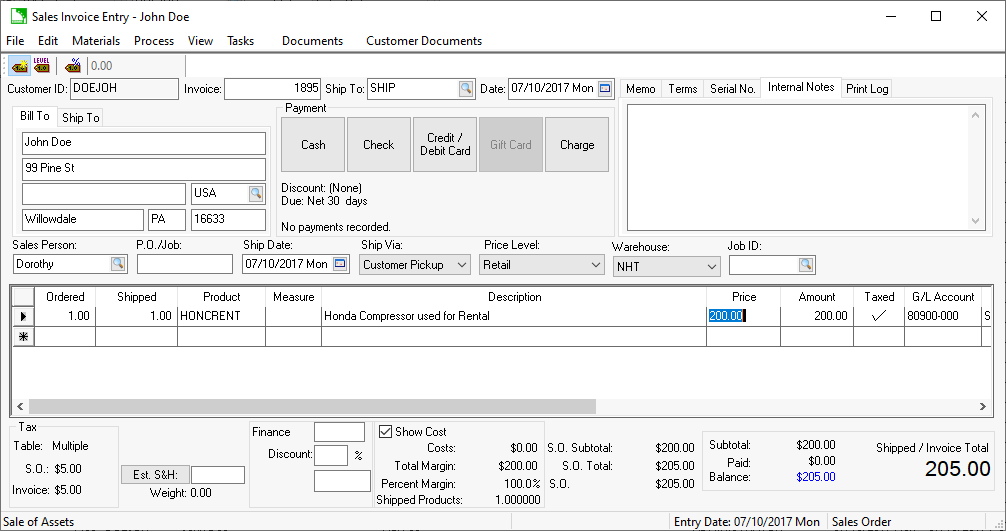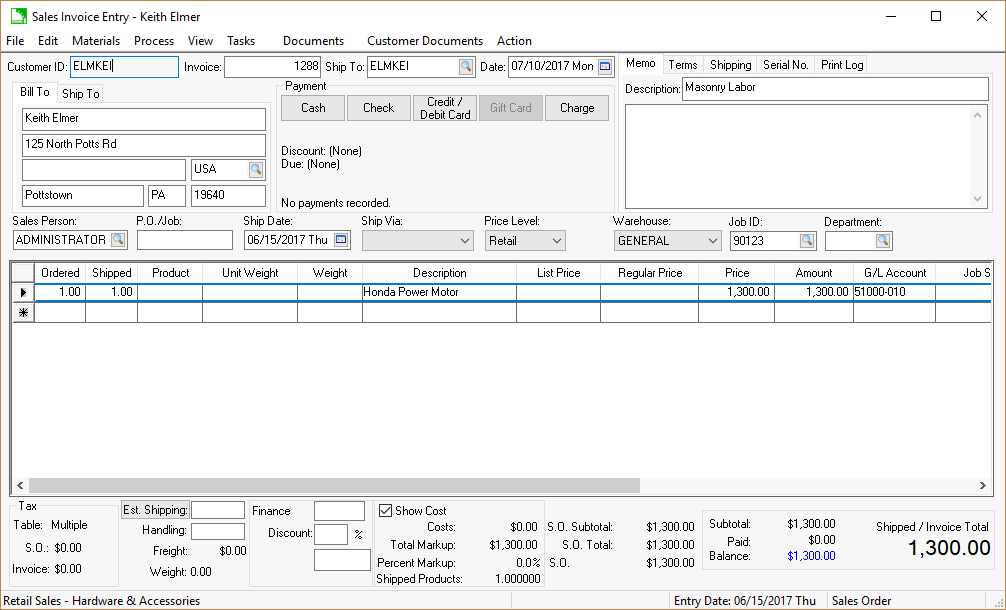Selling Assets within a Sales Invoice
The value of an asset will be recorded within the
general ledger until the asset is disposed (not being used or junked)
or sold. This section will explain the steps that should be used when
an asset is sold. See the next section, Disposing
Assets > Removing Disposed Assets, for
an alternative method to dispose assets.
Often depreciable items that are being rented using the EBMS rental
module are recorded within inventory. Rental items are normally
depreciated instead of recorded within the standard inventory system.
Many depreciable assets such as vehicles, building equipment,
and other depreciable assets are not recorded as inventory.
Selling Rental or Inventory items
Go to Sales > Invoices and S.O.s
to open the sales invoice as shown below:

Enter the sales order in a similar way as a normal sales order.
Enter the rental equipment item that was created at the time
the rental item was purchased. Review [Sales}
Rental > Getting Started > Rental Equipment for details
on creating these rental equipment product codes.
Enter the sale price into the Price
column.
The general ledger account should default to a GL account
classified as Sale of Asset to launch the
deposal of the depreciable asset.
Continue with step #6 in the next section to continue
with the sale of asset.
Selling General Depreciable items that are not recorded as rentals
or inventory items
The asset should be removed from the depreciable
assets list at the time a sales invoice is entered. Complete the following
steps to process the sale of the general fixed asset:
Go to Sales
> Invoices and S.O.s to open the sales
invoice.
.
Enter a sales order in the same manner as
any other sale with the following exceptions:
Do not enter an inventory item when selling
a depreciable asset but enter a brief Description
in the invoice detail line.
Enter the sale price of the asset that is
being sold.
Enter a G/L Account
that is classified as "Sale of Asset".
This will activate the depreciation wizard at the time the sales invoice
is processed.
Deposal of the Depreciable Asset
A separate sales invoice line should be entered for
each depreciable asset. Complete the following steps to dispose of the
asset.
Process the sales invoice to activate the
Selling a Depreciable
Asset wizard as shown below:

Choose the Depreciable
Asset that is being sold. Click on the lookup
button to select an asset from the asset list.
The Select
this option if you do not want to dispose an item at this time
option should be turned OFF. No assets will be
disposed if this option is turned ON.
Click the Next
button to continue. The following dialog
will only appear in the depreciable item is not fully depreciated.

Enter any Additional
Depreciation that is to be expensed
before the asset is disposed. This value would
be in addition to any depreciation that has been processed in the
current year or prior year. Click on the View
Accumulated button to list the total amount
of depreciation that has already been accumulated as well as the scheduled
annual amounts.
The Date
and the Depreciation
Expense Account are necessary
only if Additional
Depreciation
is entered which creates general ledger
transactions. Otherwise ignore the values of these two fields.
Click Next
to continue with the next page of the wizard as
shown below:

Select the method of disposal and the date
it is to be disposed. The contents of the
invoice will be copied into the fields on this page. These copied
values should equal the correct disposal information. Click the Finish
button to complete the disposal process.
Standard sales General Ledger transactions will be
created based on the information entered into the sales invoice. Additional
depreciation transactions will be created to dispose of the asset as listed
below:
Debit |
Credit |
Accumulated Depreciation
(Asset G/L) |
Asset Value (Asset
G/L) |
Asset Disposal
(Expense G/L) |
Depreciation
Disposal (Expense G/L) |
Additional depreciation transactions will be created
if Additional Depreciation
was entered on page 2 of the wizard.
See the following section – Disposing
Assets > Removing Disposed Assets to remove assets without using
a sales invoice.




